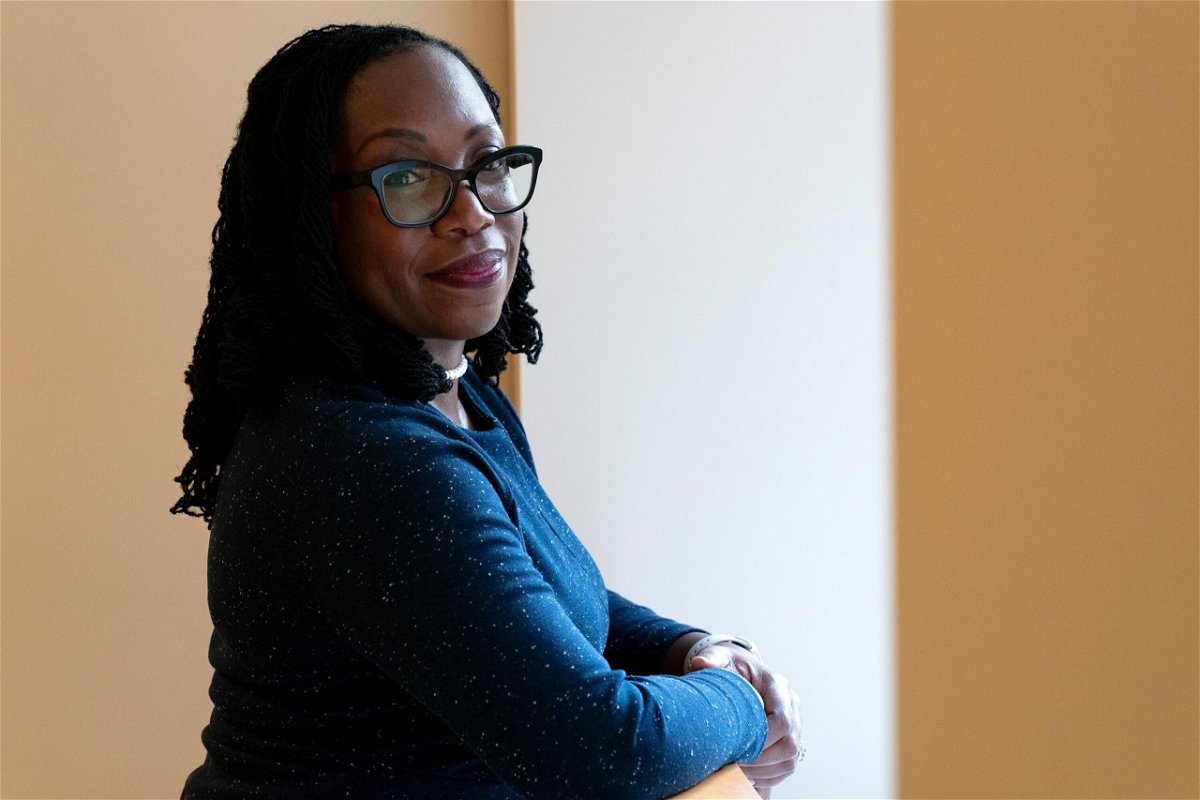Ketanji Brown Jackson’s path to the Supreme Court

Judge Ketanji Brown Jackson
By Ariane de Vogue, CNN Supreme Court Reporter
As President Joe Biden rifled through binders filled with pages of Judge Ketanji Brown Jackson’s qualifications as a part of his decision-making process, he also focused on something as valuable as her sparkling resume: her life story.
Biden, a man who often harkens back to his own working class Irish Catholic roots, studied the path taken by Jackson, who knew where she was headed as a 17-year-old in Miami.
“I want to go into law and eventually have a judicial appointment,” she wrote in her high school yearbook in an uncanny example of intuitive flash.
Jackson is the nominee for her strong resume and professional diversity she brings to bear that includes two stints at Harvard, prestigious clerkships, judicial opinions, forays into public service and time served in Big Law.
But Nan Aron, a veteran of judicial confirmation battles who now serves as a distinguished lecturer at Georgetown University Law Center, said that Biden — in looking at Jackson’s life story — followed a path of his predecessors and would-be nominees.
“In announcing a candidate, presidents like not only to emphasize analytical abilities, but they want to draw a portrait of where the candidate has come from — her experiences in life, family and relationships with peers,” Aron said.
“It’s important that any candidate for the Supreme Court understands how the law affects everyday Americans and one’s life experiences gives a hint or provides a roadmap,” she added.
Jackson’s road map began in her early years in Miami, attending a large public high school about 20 minutes south of downtown.
In the yearbook picture she is standing next to Stephen Rosenthal, a classmate she first met in the 7th grade. Unbelievably, they attended the same junior high, high school, college and law school.
“She is the only person in my life that I have such a remarkable overlap with,” he said.
Their high school, Miami Palmetto Senior High School, was multi-racial, but there was not a large population of African American students.
Rosenthal says her family was middle-class — both parents were teachers. Her father went on to a second career as a lawyer. “It was one of those working-class families that knew the power of education was important and instilled that in their kids,” he added.
Another friend, Nathaniel Persily, participated in speech and debate with Jackson. She won the national championship in original oratory and travelled extensively for tournaments across the county with her classmates. They would hold bake sales and car washes to raise funds. Their debate coach was an ardent Republican, according to Persily, and the time spent traveling across the country was an important socializing experience.
Her skills apparently came in handy in 1987 when Interior Secretary Donald Hodel visited Palmetto. He was grilled by a panel of students who questioned him about the government’s plan to permit offshore oil drilling, which critics said would endanger Florida’s reefs. “Oil and water don’t mix,” teenager Jackson was quoted as saying in a Miami Herald article.
It was during a high school debate tournament in Cambridge, Massachusetts, when Jackson first saw Harvard, an event that triggered her decision to apply.
According to Persily, during their senior year, four students gained early acceptance at Harvard, a feat so unprecedented for the large public high school that it was featured in the evening news.
“Notwithstanding that it was an intimidating place for kids coming from public school in Miami, she absolutely thrived, and she never lost sight of herself, she remained true to herself,” Rosenthal said.
At Harvard she met Patrick Jackson, a sixth-generation Harvard legacy whom she would go on to marry.
“At first we kind of gave him the side eye,” said Nina Simmons, Jackson’s roommate. “The two were very different — but the same in terms of their values, ideals and temperament.”
Simmons, who also attended Harvard Law with Jackson, said they arrived “intimidated by the grandeur” of the place.
“But Ketanji was like, ‘I see this, but I’m not going to be afraid of it,'” Simmons said.
“Harvard wasn’t always the friendliest place for students of color. In law school that was even more so,” Simmons said. “It was an intense environment that makes certain assumptions about your abilities — not always good ones, so you had to work harder and be better.”
“What she taught me was never to be afraid to take up space. She was only about 5 feet tall, but when she entered a room, she was a presence and a force.”
Rosenthal attended Jackson’s wedding. “I have this memory etched in my mind” he recalled. “You had these two families coming together from such different places.” He remembered family elders — an older Black woman and a starchly dressed White man — “having a great time — getting down on the dance floor together.”
In high school, neither Persily nor Rosenthal knew that at around the time, Jackson’s uncle — her father’s eldest brother — had been repeatedly in trouble with the law. By 1989, Thomas Brown Jr. received a sentence of life in prison related to drug charges.
According to a source familiar, neither Jackson nor her father were particularly close to Thomas, but she has a memory of her father talking on the phone episodically when his brother would call from prison. Much later, in 2005, when Jackson served as an assistant federal public defender, the uncle sent her a large brown accordion style folder with his legal appeals hoping she might help. Jackson determined her uncle had exhausted his appeals in the courts. But three years later in 2008, a friend mentioned that she was doing clemency work at a DC-based firm, triggering Jackson, who was then in private practice, to forward the file.
The firm submitted the petition on Brown’s behalf on October 7, 2014, and Obama commuted his sentence on November 22, 2016. According to the firm, Jackson had “no further involvement in the matter” after making the referral. Jackson’s chambers said she would decline comment on the issue.
The tale is not the usual story for a Supreme Court nominee, but coupled with her work as a public defender and as a commissioner on the US Sentencing Commission, it reveals a different perspective on criminal law.
Asked about Jackson’s professional stint in the Office of the Federal Public Defender, lawyer Jamie Gorelick, a longtime friend of Jackson, said her life experience brings unique perspective.
“She brings to bear an understanding of the criminal justice system that is often overlooked among Supreme Court candidates,” Gorelick said.
Early call from the White House
Six days after Biden’s inauguration last year, White House counsel Dana Remus put in a call to Jackson to see if the judge might be interested in a new job: replacing Merrick Garland on the powerful federal appeals court in Washington.
The new administration was poised to prioritize judicial vacancies and planned to push through slates of nominees that would send a message about how the President viewed the courts. Stellar credentials were essential, but Biden also wanted candidates who would bring a fresh professional and demographic diversity to benches across the country dominated by White men.
That appeals court post would serve to further season her and boost her profile.
At her 2021 confirmation hearing for the seat on the federal appeals court, Jackson talked about her professional trajectory, peppered with stints in public service.
Asked why she had chosen to go into public service earlier in her career, she said, “I remember thinking very clearly that I felt like I didn’t have enough of an idea of what really happened in criminal cases. I wanted to understand the system.”
“I thought it would be an opportunity to help people as well, I come from a background of public service. My parents were in public service, my brother was a police officer and in the military and being in the public defenders office felt very much like the opportunity to help with my skills and talents,” Jackson added.
She said the experience had made her a better judge because she remembered that many of her clients hadn’t really understood what had happened to them in the system. As a trial judge, Jackson said, she took extra care to communicate with the defendants who came before her. “I speak to them directly,” she said, because “I want them to know what is going on.”
A.J. Kramer worked with Jackson at the Federal Public Defender’s office in DC and still keeps in touch with her. He said no current member of the Supreme Court has worked as a public defender and “seen the system from that side of the aisle”.
“It’s not that you have more or less sympathy,” Kramer said in an interview, “but that you have an idea how the system actually works.”
Confirmation hearing and discussion of race and being a judge
At that Senate hearing, there were no real fireworks, but instead, an air of the inevitability of her confirmation. Republicans spent more time attacking the Biden administration or Democrats in general than targeting Jackson.
Texas GOP Sen. John Cornyn did ask Jackson about professional diversity and race.
He said her experience as a trial judge would be a “very important qualification” and praised her “impressive” background. Cornyn added that it was important for the public to have confidence in the judiciary “and I think part of that confidence is knowing that people like them can serve on the bench and that we applaud that diversity.”
But Cornyn later said that “since our Democratic colleagues seem to be placing so much emphasis on race,” he wanted to know something else. “What role does race play, Judge Jackson, in the kind of judge you have been and the kind of judge you will be?”
Without skipping a beat, Jackson said, “I don’t think that race plays a role in the kind of judge that I have been and that I would be in the way you asked that question.”
“I’m looking at the arguments, the facts and the law, I’m methodically and intentionally setting aside personal views, any other inappropriate considerations and I would think that race would be the kind of thing that would be inappropriate to inject in my evaluation of a case,” she continued.
“I would say that my different professional background than many of the court of appeals judges, including my district court background,” she said, “would bring value.”
“I’ve experienced life in perhaps a different way than some of my colleagues because of who I am and that might be valuable — I hope it would be valuable if I was confirmed to the circuit court, ” she added.
Tennessee GOP Sen. Marsha Blackburn brought up early rumors about the Supreme Court.
“I know you are fully aware that you are discussed regularly as a Supreme Court nominee,” Blackburn said before asking what the judge thought about recent proposals — driven by Democrats to try to dilute the conservative majority on the high court — to add more justices to the bench.
Jackson declined to comment.
She also provided senators a citation for an interview she gave in 2007 to The Washington Post for a story about Justice Clarence Thomas — the only African American currently on the high court.
According to the article, she recalled sitting across from Thomas at lunch once — the date of the encounter was not revealed — with a quizzical expression on her face.
“Jackson, who is black, said Thomas ‘spoke the language,’ meaning he reminded her of the black men she knew. ‘But I just sat there the whole time thinking: ‘I don’t understand you. You sound like my parents. You sound like the people I grew up with.’ But the lessons he tended to draw from the experiences of the segregated South seemed to be different than those of everybody I know,'” the article read.
Republicans who ended up voting to confirm her to the DC Circuit were Susan Collins of Maine, Lindsey Graham of South Carolina and Lisa Murkowski of Alaska.
Before joining the federal judiciary
If confirmed, Jackson will follow in the footsteps of the likes of Chief Justice John Roberts and Justices Neil Gorsuch and Brett Kavanaugh, who took the seats of the justices they had worked for.
Jackson clerked for Breyer during the 1999 term after serving as a clerk in 1997-1998 to Judge Bruce M. Selya, a federal judge in Massachusetts.
At an event in 2017 sponsored by the liberal American Constitution Society, she called working for Breyer an opportunity of a lifetime “to bear witness to the workings of his brilliant legal mind.” She also joked about how the justice often biked to work and would show up in his majestic chamber wearing “full bicycle regalia.”
Jackson left law firm life behind in 2010 to become a commissioner on the US Sentencing Commission, an independent agency that establishes sentencing policies and practices for the federal courts. She has said she learned to knit during her Senate confirmation process to channel her nervous energy.
Rachel Barkow, now a professor of law at New York University, served with Jackson on the bipartisan commission and noted pointedly how well the members worked together despite ideological differences. Another commissioner at the time was William H. Pryor Jr., a conservative judge who sits on the 11th US Circuit Court of Appeals.
Barkow said Jackson was an “upbeat presence” who always does “what she is supposed to do, when she says she is going to do it.”
At the time, federal prisons were over capacity, and there was widespread bipartisan acknowledgement that federal drug sentences were too long. The seven-member body unanimously decided to lower federal drug sentences. They made the reductions retroactive, Barkow said, which meant more than 30,000 federal prisoners got lower sentences.
Obama would go on to nominate Jackson to the US District Court for the District of Columbia, which she joined in 2013. For that confirmation hearing, she was introduced by a well-known Republican, Wisconsin’s Paul Ryan, who would go on to become speaker of the House and who happened to be related to her by marriage. (Jackson’s husband’s twin brother is married to the sister of Ryan’s wife.)
“I know she is clearly qualified,” Ryan said. “But it bears repeating just how qualified she is.”
“Our politics may differ, but my praise for Ketanji’s intellect, for her character, for her integrity, is unequivocal,” he added.
At each of her judicial confirmation hearings, Patrick Jackson, a DC-based surgeon, has been pictured sitting behind her. The couple share two daughters, Talia and Leila. Her mother, a former public school science teacher and principal of a public magnet school in South Florida, and her father, a public high school teacher who was later chief counsel to the Miami-Dade County school board, also have been in attendance.
In a 2017 speech at the University of Georgia School of Law, she reflected on her journey as a mother and a judge, emphasizing how hard it is for mothers to serve in big law firms — something she said she had done at times to help support her family.
She noted that the hours are long and there is little control over the schedule, which is “constantly in conflict with the needs of your children and your family.” She also highlighted the traps of launching a career in the law and pointed to recent studies that show that lawyers of color — both male and female — constitute only 8% of law firm equity partners nationwide.
The-CNN-Wire
™ & © 2022 Cable News Network, Inc., a WarnerMedia Company. All rights reserved.



